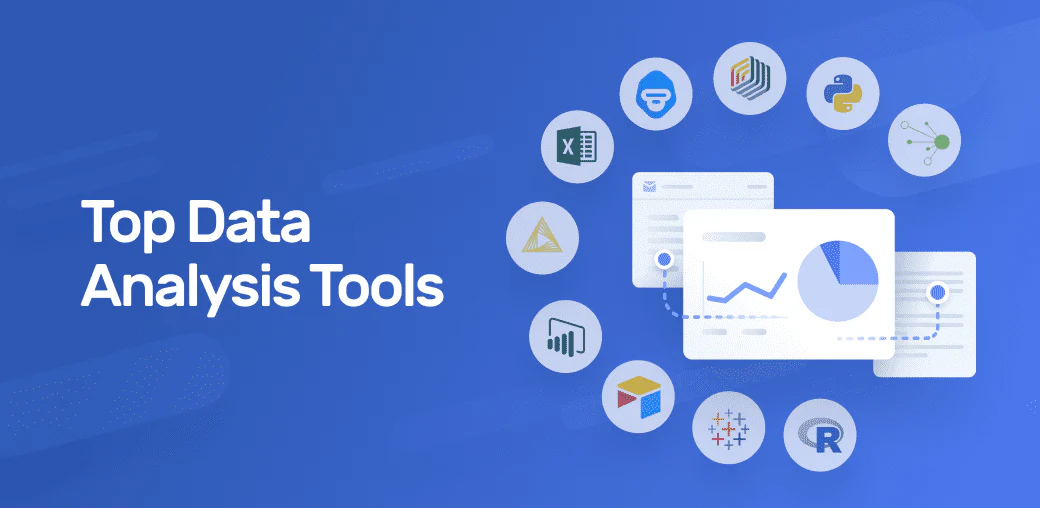Data Analytics Tools and Software: A Comprehensive Overview

Strong 8k brings an ultra-HD IPTV experience to your living room and your pocket.
In the era of big data, organizations are inundated with vast amounts of data generated from various sources. To extract meaningful insights and make informed decisions, businesses rely on data analytics tools and software. This article provides a comprehensive overview of the diverse range of data analytics tools and software available in the market, their features, and applications.
What are Data Analytics Tools?
Data analytics tools are software applications designed to analyze, manipulate, visualize, and interpret data to uncover patterns, trends, and correlations. These tools leverage advanced algorithms and techniques to process large datasets efficiently and derive actionable insights that drive business decision-making.
Types of Data Analytics Tools:
a. Business Intelligence (BI) Tools: BI tools such as Tableau, Power BI, and QlikView enable users to create interactive dashboards, reports, and visualizations to gain insights into key performance metrics and trends.
b. Data Visualization Tools: Data visualization tools like D3.js, Plotly, and matplotlib allow users to create compelling visual representations of data, including charts, graphs, maps, and infographics, to facilitate data exploration and communication.
c. Statistical Analysis Tools: Statistical analysis tools such as R, Python with libraries like Pandas and NumPy, and MATLAB enable users to perform complex statistical analysis, hypothesis testing, and predictive modeling to uncover hidden patterns and relationships in data.
d. Machine Learning Platforms: Machine learning platforms like TensorFlow, scikit-learn, and PyTorch provide tools and libraries for building and deploying machine learning models for tasks such as classification, regression, clustering, and recommendation systems.
e. Data Mining Tools: Data mining tools like RapidMiner, KNIME, and Orange enable users to discover patterns, anomalies, and trends in large datasets through techniques such as clustering, association rule mining, and text mining.
f. Data Preparation Tools: Data preparation tools such as Alteryx, Trifacta, and DataRobot streamline the process of cleansing, transforming, and integrating data from disparate sources, ensuring data quality and consistency before analysis.
Key Features of Data Analytics Tools:
a. Data Connectivity: Support for connecting to various data sources, including databases, spreadsheets, APIs, and cloud storage platforms.
b. Data Processing: Ability to handle large volumes of data efficiently through parallel processing, in-memory computing, and distributed computing.
c. Visualization Capabilities: Intuitive and customizable visualization options for creating interactive charts, graphs, and dashboards to convey insights effectively.
d. Advanced Analytics: Built-in algorithms and functions for statistical analysis, machine learning, predictive modeling, and text analytics.
e. Collaboration and Sharing: Collaboration features such as sharing, commenting, and version control to facilitate teamwork and knowledge sharing.
f. Scalability and Performance: Scalable architecture and high-performance computing capabilities to handle increasing data volumes and processing requirements.
g. Security and Compliance: Robust security features, encryption, and access controls to ensure data privacy, confidentiality, and compliance with regulatory requirements.
Applications of Data Analytics Tools:
a. Business Intelligence and Reporting: Generating interactive dashboards and reports to monitor key performance indicators (KPIs), track business metrics, and identify trends.
b. Predictive Analytics: Forecasting future trends, predicting customer behavior, and optimizing business processes through predictive modeling and machine learning algorithms.
c. Customer Segmentation and Personalization: Segmenting customers based on demographics, behavior, and preferences to target personalized marketing campaigns and improve customer engagement.
d. Fraud Detection and Risk Management: Identifying fraudulent activities, anomalies, and risks in financial transactions, insurance claims, and cybersecurity threats.
e. Supply Chain Optimization: Analyzing supply chain data to optimize inventory management, demand forecasting, logistics, and procurement processes.
f. Healthcare Analytics: Analyzing patient data, clinical trials, and electronic health records (EHRs) to improve patient outcomes, personalize treatments, and identify disease patterns.
g. Social Media Analytics: Monitoring social media conversations, sentiment analysis, and social listening to understand customer feedback, brand perception, and market trends.
Data analytics has become an indispensable skill in today's data-driven world, with organizations increasingly relying on data to make informed decisions and gain a competitive edge. As a result, there is a growing demand for professionals proficient in data analytics. In India, numerous training course providers offer comprehensive programs to equip individuals with the necessary skills and knowledge in data analytics. This section explores some of the prominent data analytics training course provider in Indore, India, their offerings, and the benefits they provide to aspiring data analysts.
Great Learning:
Great Learning is a leading provider of online and classroom-based data analytics courses. They offer specialized programs such as the Post Graduate Program in Data Science and Business Analytics, which covers topics like data visualization, machine learning, and big data analytics. Their courses are designed by industry experts and feature hands-on projects, case studies, and mentorship to ensure practical learning.
Simplilearn:
Simplilearn is a popular online learning platform offering a wide range of data analytics courses, including Data Science with Python, Data Analyst Master's Program, and Big Data Engineer Master's Program. Their courses are highly interactive and include video lectures, quizzes, and real-world projects to enhance learning outcomes. Simplilearn also provides industry-recognized certifications upon course completion, making it a preferred choice for aspiring data analysts.
Jigsaw Academy:
Jigsaw Academy is a renowned analytics training institute that offers specialized courses in data science, machine learning, and business analytics. Their flagship program, the Full Stack Data Science Program, covers essential concepts such as data preprocessing, statistical analysis, and predictive modeling. Jigsaw Academy's courses are designed in collaboration with industry experts and feature hands-on labs and industry projects for practical exposure.
Uncodemy:
Uncodemy is a leading analytics training institute known for its comprehensive data analytics courses and certifications. They offer specialized programs such as the Data Science Bootcamp and Business Analytics Certification Program, which cover topics like data mining, text analytics, and predictive modeling. AnalytixLabs' courses are designed to cater to both beginners and experienced professionals looking to advance their careers in data analytics.
Edureka:
Edureka is a prominent online learning platform offering a wide range of data analytics courses, including Data Science, Big Data, and Business Intelligence. Their courses are delivered by industry experts through live instructor-led sessions and feature hands-on projects, quizzes, and assignments to reinforce learning. Edureka also provides 24/7 technical support and lifetime access to course materials, making it a convenient choice for working professionals.
Benefits of Data Analytics Training Course Providers:
a. Comprehensive Curriculum: Data analytics training course providers in Noida, Gurgaon, Faridabad and other cities in India offer comprehensive programs covering a wide range of topics, including data manipulation, statistical analysis, machine learning, and big data technologies.
b. Hands-on Learning: These courses provide hands-on experience through real-world projects, case studies, and interactive labs, allowing students to apply theoretical concepts to practical scenarios.
c. Industry Recognition: Many data analytics training course providers offer industry-recognized certifications upon course completion, enhancing the credibility and employability of graduates.
d. Flexibility: Online learning platforms offer flexibility in terms of schedule and location, allowing students to learn at their own pace and convenience.
e. Career Support: Some course providers offer career support services such as resume building, interview preparation, and job placement assistance to help students kickstart their careers in data analytics.
Conclusion:
Data analytics training course providers play a crucial role in bridging the skills gap and preparing individuals for lucrative careers in data analytics. By enrolling in these courses, aspiring data analysts can acquire the requisite skills, knowledge, and certifications to excel in this rapidly growing field and contribute to the success of organizations across industries.
Data analytics tools and software play a pivotal role in helping organizations harness the power of data to drive strategic decision-making, improve operational efficiency, and gain a competitive edge in today's data-driven world. By leveraging the diverse range of data analytics tools available, businesses can unlock valuable insights, uncover hidden opportunities, and navigate complex challenges to achieve their business objectives.
Note: IndiBlogHub features both user-submitted and editorial content. We do not verify third-party contributions. Read our Disclaimer and Privacy Policyfor details.


